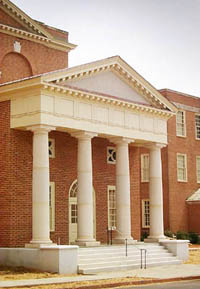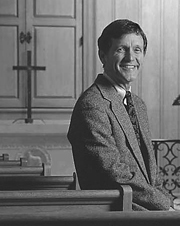Divinity school opens to first students in August
 After more than a decade of planning and preparation, the Wake Forest University Divinity School opens this fall to 24 full-time students from a variety of denominational traditions.
After more than a decade of planning and preparation, the Wake Forest University Divinity School opens this fall to 24 full-time students from a variety of denominational traditions.
The 19 women and five men who start classes Aug. 25 are seeking a master of divinity degree through the new three-year program. Within three years, school officials expect the program to enroll about 110 students, with a core, full-time faculty of eight. Enrollment could go as high as 135.
“We are pleased with the diversity of this first class of students,” said Director of Admissions and Student Services Scott Hudgins. “They range in age from 21 to 74, four of them have spent the last year overseas in service and study and there is a wide representation of faiths, including Baptists, a Lutheran, a Catholic, Moravians, Presbyterians, Episcopalians and United Church of Christ.
“Academically, they are extremely well prepared, and come with a commitment to ministry,” added Hudgins.
The divinity school will formally celebrate its opening with two days of events on Oct. 12 and 13. An inaugural convocation, featuring an address by the school’s dean, will take place the evening of Oct. 12. Other activities will include a worship service, lectures and faculty seminars.
The divinity school is the first professional school to open at Wake Forest since the Babcock Graduate School of Management was founded in 1969. Trustees approved the idea of opening a divinity school in 1989, but the opening was contingent upon the university developing adequate financial support. To date, the divinity school has received more than $10 million in pledges and gifts.
 “The opening of this divinity school is really historical because it links Wake Forest to its past,” said Divinity School Dean Bill J. Leonard. “One of the early visions of Samuel and Sarah Wait, the founders of Wake Forest College, was to train ministers for churches in this region.”
“The opening of this divinity school is really historical because it links Wake Forest to its past,” said Divinity School Dean Bill J. Leonard. “One of the early visions of Samuel and Sarah Wait, the founders of Wake Forest College, was to train ministers for churches in this region.”
Leonard, a Baptist minister, was named as the school’s founding dean in 1996. A nationally known church historian, Leonard has devoted his career to the ministry, teaching and writing. He earned a doctorate in American Church History at Boston University after receiving a bachelor of arts degree at Texas Wesleyan University and a master of divinity at a Baptist seminary. He has also done post-doctoral study at Yale University.
The school’s curriculum is centered in the classical theological disciplines of biblical studies, church history, theology and ministry studies, which include areas such as pastoral care and preaching.
“Issues of theological education and spirituality have a place in the academic life of Wake Forest,” said Leonard. “We believe that theological education brings a completion to the university in the midst of our other professional schools because the ideas and issues relative to faith, ethics and theological ideas are important on a university campus.”
Courses will be taught by divinity school faculty, as well as faculty of Wake Forest’s undergraduate, graduate and professional schools. For instance, a student may take a class in the law school or a class in Greek from the classical languages department. Such an interdisciplinary approach is considered the school’s hallmark.
Wingate Hall, adjacent to Wait Chapel, is home to the new divinity school. The building also houses the university’s religion department.
This summer, the university completed construction of a 2,600-square-foot addition to Wingate Hall. The addition provides Wingate Hall with a new entrance distinguished by four columns and a foyer featuring an inlaid marble cross in its floor.
The addition contains eight divinity school offices. Classes are held elsewhere in the building.
Divinity school faculty members are Leonard; Phyllis Trible, associate dean and professor of biblical studies; Frank Tupper, professor of theology; Samuel Weber, associate professor of early Christianity and spiritual formation; Alexandra R. Brown, visiting associate professor of biblical studies; and James M. Dunn, visiting professor of Christianity and public policy. Among the future faculty to be named is a professor of preaching and homiletics, beginning in fall 2000.
The staff includes Scott Hudgins, director of admissions and student services; Wade Stokes, director of development; and Jill Crainshaw, director of supervised ministries.



